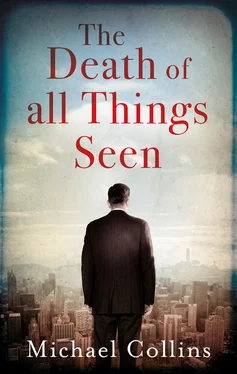In the clearing of the far North, his father maintained, there were no stories of drunkenness or disaffection with life. Each could carve, and did, reeds planed to a fine-grained translucent parchment, wood whittled to release the fluted trill of a songbird’s call.
They were on a grey scratch of road.
His father drank again from his tumbler of whiskey. He imagined Per, in the metronome swish of a weighted axe, in great advancing strides coming upon a stream, drinking like a horse in a satiating quench, and, at day’s end, pitching an impoverished tent, flint struck against the coming dusk, a glow of kindling coaxed with a whisper, the sudden bloom of his shadowy form and his hand cupped like a teller of a great secret.
It was thus told, in the way stories are, for the listener, but for the teller, too. His father filled with an emptiness of his own days pitted against a heroic life that most probably never existed, which made it all the more irreconcilable, more tragic, because he believed it in his heart, and he would not be dissuaded that there was another way, when there never was.
JOANNE DIDN’T KNOW anyone could still get carsick. Maybe it had been the McDonald’s. It was a plausible alternative explanation.
They were in the suburb of Winnetka. Joanne rubbed Grace down with baby wipes. Norman was out of the car, too, compliantly holding the box of baby wipes.
Joanne pointed to a shop across the road from a café. Maybe Norman could get a coffee, while ‘the girls went shopping’. Joanne turned to Grace. ‘Maybe they have dolls?’
*
Norman acquiesced, left them and went over to the café and ordered a double espresso. In a day waning toward a darkening sky, he saw already, beyond a tree line of oak and cedar, the visible glow of city-light pollution, a soft, bathing light belying an afternoon of falling temperatures and the gridlock of a treacherous afternoon commute.
They might yet be trapped out here. There was the issue of Randolph. Norman didn’t want to think about it, the piling of responsibilities that could pull you under and take you from any central and focused interest. There was much beyond his control.
Norman felt it. All that had been so recently lost to him. Not least, the loss of Daniel Einhorn’s investment that might have propelled Norman toward greater success. Money accrued in the essential fraud of how so much of the world had been built upon deceit. It sickened Norman, not least that it had ended before he could cash in. There was the sudden and unsettling sense that his life had reached a point where the best years were behind him. It struck out here in the most unlikely of places, not in the confines of his office, but in the run of life and the coldness of an advancing afternoon.
In the quiet indeterminacy, Norman opened and reread Nate Feldman’s email. What struck him again was the language, the authoritative but ingratiating, accessible tone. Here was a man who could find a broad and accomplished reach in the measure of a single line or two.
It irked Norman. It must have been this way with Mr Feldman. The executive shorthand of a voice and lines that could communicate a buoying optimism or reprimand, without ever using the exact words of praise or indictment. Mr Feldman moving around the center of an emotion, so he was never any one thing, but the sum of a continuance in the aftermath of great slaughter, and at the end, sequestered in a skyscraper, among a pantheon of demi-gods surveying the antlike procession of what now constituted the emerging world.
Norman looked up in the contained world of the coffee shop. He felt like a man long submerged, breaking the surface of water again. His breath came in fits. He should have stayed at home. This advance on his old life, it meant nothing. What did the Feldmans want from him? He felt himself asking it.
Despite his better judgment, Norman did a search on the name Nate Feldman. There was an article concerning a Nate Feldman and the sale of Grandshire Organics to a Toronto-based multinational for 15.5 million Canadian dollars. The article was dated April 11 2001. In bold lettering, midway through the article, Nathaniel Feldman was listed as founder and CEO.
There was an insert photograph, the evidence incontrovertible. Nate Feldman, the spitting image of his father. His age was listed as forty-eight, the same age Mr Feldman had been when Helen had come under his sway of influence. It did something to Norman, the alignment of these men in his life.
He pulled up Mr Feldman’s obituary, the lauded account of his heroics in the Pacific, his subsequent rise within the Insurance industry. He was an avid outdoorsman. His interests included golf, fishing and carpentry. He was born in Saint Cloud, Minnesota.
Norman set his phone aside. He felt an out of body experience. The Feldman men, they had a shared acumen for making money. He felt a fitfulness of breath. He wanted to go home. It was too much to bear. He had been wrong in appeasing Joanne when she had suggested they go see the house. His first instinct had been right.
Goddamn the Feldmans! Goddamn Nate Feldman! He felt the mantra of words repeated. They undercut an understanding he had always believed, how the universe worked in relation to one’s efforts and hard work, when now, it was all too patently apparent that the universe didn’t align with that at all, and that greatness was bestowed on certain persons. He had read about it, fundamentalist sects attesting that certain men were predestined to salvation and that God, in showing favor, allowed them to stand as pillars of virtue and examples of God’s favoring grace. There was nothing unabashed about wealth and success. It accounted for every televangelist in a three-thousand-dollar-suit asking for tithes from the faithful, the sick and indigent alike.
Something inside him dropped. It was envy, yes, that, but also a sense of his own shortcoming, an unsettling and fundamental misunderstanding of the world, and how it could be negotiated by a man like Mr Feldman and seemingly, too, by his son, Nate Feldman, when he, Norman Price, had failed so miserably, he, along with Walter and Helen.
How could he not help but compare the Feldman trajectory, their greatness, the Feldmans’ sentient awareness of trends and markets, and the ennobling reach of Mr Feldman, who had come from nothing. It was there in black and white, goddamn it!
*
A half-hour had passed. Norman felt obliged to order another espresso. He got up and stared into the approaching dark. They should head back home. There were times when nothing seemed worth it.
He was on the verge of a meltdown. He thought of alternatives to going back into the city. They could push on north into Wisconsin, stop at some rest area and search the Internet for some mid-winter, cut-rate deal at a boutique hotel along Lake Geneva. Why not salvage the remainder of the week, make use of the car, spend a quiet reprieve around the languid history of a lake where the robber barons of old had retreated in the midsummer heat? He could call and simply extend the car rental.
He would suggest it to Joanne when she got back. He thought of Randolph, the infuriating reach of this responsibility. They would go and simply get Randolph, or maybe Norman would simply drop off Joanne and Grace, and then return the car himself, but then the car was in Joanne’s name!
Norman struggled to regain a sense of perspective. It didn’t matter, the particulars, what he did, or didn’t do. It was about what Nate Feldman thought Norman was doing. That was the goddamn point. He felt the fury of distraction. He had never worked well under pressure.
He would not meet with Nate Feldman. He took a deep breath to reorient himself. A reasonable lie coalesced. He was vacationing at Lake Geneva. It was all that needed to be stated, no explanation given. It was just a stated fact. He liked the idea very much. A mid-week retreat was just the sort of casual ease Norman wanted to project on goddamn Nate Feldman. Yes, any meeting with Nate Feldman would have to be postposed. Fuck Nathaniel Feldman.
Читать дальше












